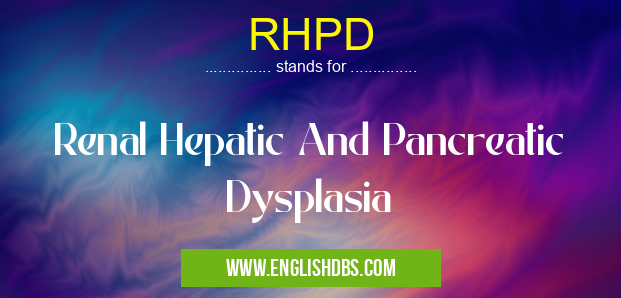What does RHPD mean in DISEASES
Renal Hepatic And Pancreatic Dysplasia (RHPD) is a medical condition, which is characterized by the malformations and the developmental problems of the organs in the renal, hepatic and pancreatic systems. The disorders caused by the RHPD can affect any of these organs and their respective systems. It is a genetic disorder that affects both children and adults. RHPD causes severe symptoms including renal failure, liver failure, jaundice, weight loss, fatigue, anemia and digestive issues.

RHPD meaning in Diseases in Medical
RHPD mostly used in an acronym Diseases in Category Medical that means Renal Hepatic And Pancreatic Dysplasia
Shorthand: RHPD,
Full Form: Renal Hepatic And Pancreatic Dysplasia
For more information of "Renal Hepatic And Pancreatic Dysplasia", see the section below.
Cause
The exact cause of RHPD is still unknown but it may be related to genetic factors and environmental exposures like drugs or toxins. In some cases, RHPD can be passed on from parent to child through faulty gene inheritance. Some people can also develop this condition due to certain medications they are taking.
Symptoms
The symptoms will vary depending on which organ or system is affected by RHPD. However, some common signs include fatigue, anemia, weight loss, high fever, abdominal pain with nausea and vomiting, jaundice in newborn babies and other liver-related conditions such as cirrhosis or hepatitis. Other complications associated with this condition include kidney failure, pancreatitis and digestive issues like diarrhea or constipation.
Diagnosis
In order to diagnose RHPD, doctors will first need to take patient’s history including family history and look for physical signs of the disorder like malformations in the affected organs. Additionally several tests such as blood tests for levels of electrolytes; urine tests; imaging scans such as Ultrasound; CT scan; MRI scan; X-rays; endoscopy etc.; biochemical analyses; genetic testing etc. may be performed for confirmation.
Treatment
The treatment for RHPD depends upon its severity as well as type of organ/system that has been affected. Usually supportive care such as antibiotics for infections; fluid therapy; dietary support (in case of malabsorption); medications to treat specific symptoms if present etc.; therapeutic interventions like dialysis or transplantation may be necessary if the disease progresses to an advanced stage.
Essential Questions and Answers on Renal Hepatic And Pancreatic Dysplasia in "MEDICAL»DISEASES"
What is Renal Hepatic And Pancreatic Dysplasia (RHPD)?
Renal Hepatic And Pancreatic Dysplasia (RHPD) is a congenital disorder that affects the kidneys, liver and pancreas. It is an extremely rare condition caused by a defect in the normal development of the tissues that make up these organs. RHPD can lead to multiple organ dysfunction due to abnormal tissue growth and impaired organ function.
What are the signs and symptoms of RHPD?
Symptoms of RHPD vary depending on which organs are affected. Common signs and symptoms include poor growth, vomiting, low blood sugar, slow heart rate, jaundice or yellowing of the skin and eyes, and enlarged lymph nodes. In some cases, there may be abdominal pain or swelling due to fluid buildup around the organs.
What are the risk factors for developing RHPD?
The exact cause of RHPD is unknown, but it is believed to be genetic in nature. People with a family history of renal hepatic diseases are more likely to develop this condition. In addition, premature birth or low birth weight can increase the risk. Mothers who have certain infections during pregnancy can also increase their baby’s risk for developing RHPD.
How is RHPD diagnosed?
To diagnose RHPD, your doctor will review your medical history and perform a physical examination. Imaging tests such as ultrasound or MRI may be performed to examine your organs in more detail. Your doctor may also conduct laboratory tests such as liver function tests to measure enzyme levels in your body or urine tests to look for any abnormalities in your kidneys’ functioning.
What treatments are available for rhpd?
Treatment for RHPD depends on which organs are affected and how severe the dysfunction is. Treatment may include medications to reduce inflammation or regulate organ function; dialysis to remove toxins from the body; nutritional support; surgery; or stem cell transplants if necessary. In some cases, lifestyle modifications such as diet changes and exercise may also be recommended to improve overall health and wellbeing.
Is there a cure for rhpd?
Unfortunately, there is no cure available for RHPD at this time. Treatment focuses on managing symptoms and minimizing complications by controlling inflammation through medications or other interventions while trying to maintain normal organ function as much as possible.
Are there any long-term complications associated with rhpd?
Yes, some long-term complications associated with RHPD can include chronic kidney disease (CKD), cirrhosis of the liver, diabetes mellitus (DM), pancreatitis (inflammation of the pancreas) and malabsorption syndromes due to inadequate digestion of food nutrients.
Are there ways I can reduce my risk of developing rhpd?
While there is no sure way to prevent RHPD from occurring, you can reduce your risk by maintaining good prenatal care throughout pregnancy; avoiding certain infections when pregnant; managing any pre-existing conditions related to your kidneys or digestive system; eating a balanced diet; exercising regularly; getting adequate rest; avoiding smoking and alcohol consumption during pregnancy; avoiding exposure to environmental toxins; and taking prescribed medications as directed.
How do I know if my child has rhpd?
If you suspect that your child has RHPD based on their symptoms or medical history then you should contact their healthcare provider immediately so they can assess their situation further through diagnostic testing such as imaging scans or laboratory tests.
Final Words:
Rhpd is a complex medical condition that affects multiple organs within our body causing severe health consequences like renal failure or cirrhosis at an advanced stages. Early diagnosis followed by right treatment protocol is very important for managing this serious health problem effectively.
